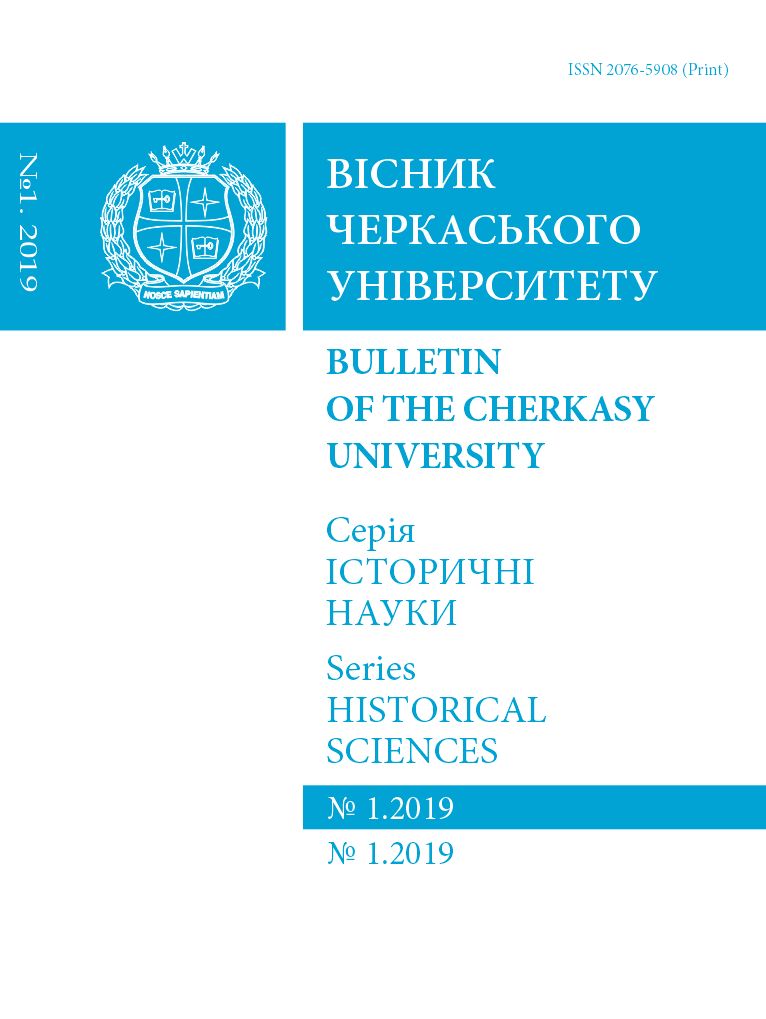Mykhailo Hrushevsky on education and science as factors of post-war reconstruction
Main Article Content
Abstract
Abstract. The purpose of the study is to reproduce the features of M. Hrushevsky's vision of the importance of the factors of education and science for the post-war reconstruction of Ukrainian lands. The methodological basis of the work is an interdisciplinary approach with particular emphasis on the structural-functional systematic analysis of historiographical facts and the comparative-historical method based on the principles of objectivity and historicism. The scientific novelty of the article lies in the study of the little-known problem of M. Hrushevsky's understanding of education and science as factors of post-war reconstruction. The article has concluded, that M. Hrushevsky gave primary importance to the factors of education and science for the reconstruction of Ukrainian lands after the end of the First World War. According to his reasoned belief, the state should invest particularly intensively in the development of all levels of Ukrainian-language education - from elementary to university levels. At the same time, the historian points out, the new educational program must be maximally internationalized for the rapid assimilation of the cultural achievements of Western partners. This should become a guarantee of raising a conscious and educated generation of Ukrainian citizens, prepared for the fundamental modernization of all aspects of the country's life. The restructuring of educational processes, M. Hrushevsky is convinced, should be accompanied by changes in the scientific and organizational areas. The scientist's efforts in this direction were focused on the creation of a wide network of Ukrainian scientific institutions, whose activities were to be moderated by the National Academy of Sciences. It is such a symbiosis of educational and scientific factors, as the prominent historian argued, that is able to ensure the quick and high-quality restoration of war-ravaged Ukrainian lands.
It should be noted that despite all the convention of historical parallels, the recipe for national recovery proposed by M. Hrushevsky with minor adjustments is fully suitable for the current situation of overcoming the consequences of Russian aggression. After all, Putin's reincarnation of russism primarily attacks Ukrainian culture, trying to strike at the foundations of national identity and thereby overcome our resistance. Therefore, today, as well as more than a century ago, the Ukrainian state should pay primary attention to issues of education and science.
Article Details
References
References
Pankova, S. M. (2018). Journalism of Mykhailo Hrushevskyi as a source of research on social and political thought in Ukraine at the end of the 19th – beginning of the 20th century: thesis candidate history Sciences: 07.00.06. Kyiv [in Ukrainian].
Hyrych, I. (2015). Mykhailo Hrushevskyi: journalism of the Ukrainian revolution (1917–1919). In: Hrushevskyi M. Povorotu ne bude!: Sotsialno-politychni pratsi 1917–1918 rr. [Hrushevskyi M. There will be no return!: Social and political works of 1917–1918]. Kharkiv: Vydavets Savchuk O.O., 942. [in Ukrainian].
Telvak, V. (2008). The creative heritage of Mykhailo Hrushevskyi in the estimation of contemporaries (end of the 19th – 30s of the 20th century). Kyiv; Drohobych [in Ukrainian].
Telvak, V. (2012). The figure of Mykhailo Hrushevskyi in the historiography of Central-Eastern Europe (end of the 19th – 30s of the 20th century). Drohobych [in Ukrainian].
Telvak, V., Kurylyshyn, K., Telvak, V. (2022). Mykhailo Hrushevskyi and the magazine “Dilo”: cooperation, conflicts, reception (until 1914). Rukopysna ta knyzhkova spadshchyna Ukrainy [Manuscript and book heritage of Ukraine], 28, 347–371 [in Ukrainian].
Pyrig, R., Telvak, V. (2021). Mykhailo Hrushevskyi: biography against the background of the times. Kherson [in Ukrainian].
Pyrig, R., Telvak, V. (2016). Mykhailo Hrushevskyi: biographical essay. Kyiv [in Ukrainian].
Hrushevskyi, M. S. (2005). The next thing to do. Hrushevskyi M. S. Hrushevskyi M. S. Tvory: u 50 t. T. 3 [Works: in 50 volumes, V. 3]. Lviv: “Svit” Publishing House, 522–527 [in Ukrainian].
Hrushevskyi, M. S. (2007). Address “To Ukrainians – professors and teachers of higher schools”. Hrushevskyi M. S. Tvory: u 50 t. T. 4. Kn. 1 [Hrushevskyi M. S. Works: in 50 volumes, V. 4. B. 1]. Lviv: “Svit” Publishing House, 5 [in Ukrainian].
Hrushevskyi, M. S. (2007). On the threshold of New Ukraine: Hatreds and dreams. Hrushevskyi M. S. Tvory: u 50 t. T. 4. Kn. 1 [Hrushevskyi M. S. Works: in 50 volumes, V. 4. B. 1]. 225–266 [in Ukrainian].
Hrushevskyi, M. S. (2007). History and its social and educational significance. Hrushevskyi M. S. Tvory: u 50 t. T. 4. Kn. 1 [Hrushevskyi M. S. Works: in 50 volumes, V. 4. B. 1]. Lviv: “Svit” Publishing House, 267–278 [in Ukrainian].
Sokhan, P. S., Ulyanovsky V. I., Kirzhaev S. M. (1993). M. S. Hrushevsky and Academia: idea, competition, activity. Kyiv [in Ukrainian].
Plastun, O. V. (2016). M. S. Hrushevskyi as an organizer of education during the days of the Ukrainian Soviet Socialist Republic (March 1917 – April 1918). Barska zemlia Podillia: yevropeiska spadshchyna ta perspektyvy staloho rozvytku [Bar land of Podillia: European heritage and prospects for sustainable development]. Kyiv; Bar, 165–169 [in Ukrainian].
Onoprienko, V., Reent, O., Shcherban, T. (1998). Ukrainian Scientific Society: 1907–1921. Kyiv [in Ukrainian].
Ulyanovskyi, V. (2002). Why Hrushevskyi’s “Prague Historical School” was not created. Ukrainskyi istoryk [Ukrainian historian], 1–4, 209–256 [in Ukrainian].
Telvak, V. (2008). The activity of Mykhailo Hrushevskyi during the emigration period in discussions of the first half of the 20s. Istoriohrafichni doslidzhennia v Ukraini [Historiographic research in Ukraine], 18, 181–203 [in Ukrainian].
Matyash, I. (2000). Ukrainian Sociological Institute of M. S. Hrushevskyi: main directions and stages of activity. Ukrainskyi istoryk [Ukrainian historian], 4, 44–56 [in Ukrainian].
Yurkova, O. V. (1999). Activities of the research department of the history of Ukraine of M. S. Hrushevskyi (1924–1930). Kyiv: Institute of History of Ukraine, National Academy of Sciences of Ukraine, [in Ukrainian].
Hrushevskyi, M. S. (2013). Speech by M. Hrushevskyi at the jubilee meeting on the occasion of the 60th anniversary of his birth and the 40th anniversary of scientific work (October 3, 1926). Hrushevskyi M. S. Tvory: u 50 t. T. 4. Kn. 2 [Hrushevskyi M. S. Works: in 50 volumes, V. 4. B. 2]. Lviv: “Svit” Publishing House, 345–349 [in Ukrainian].

